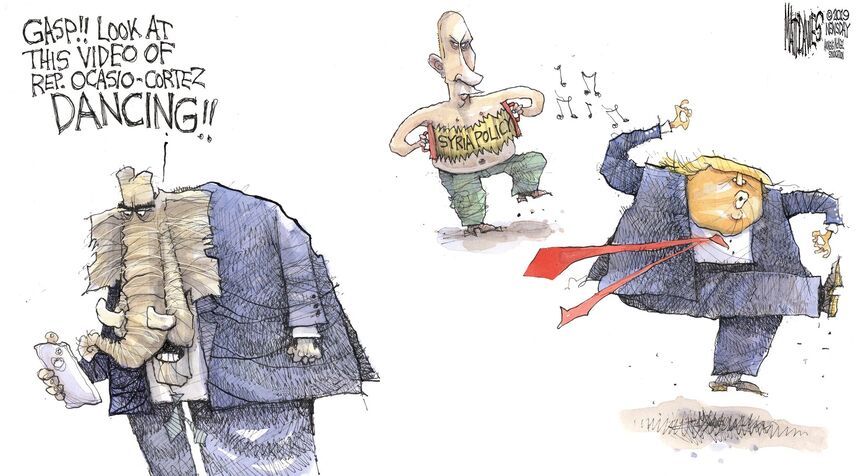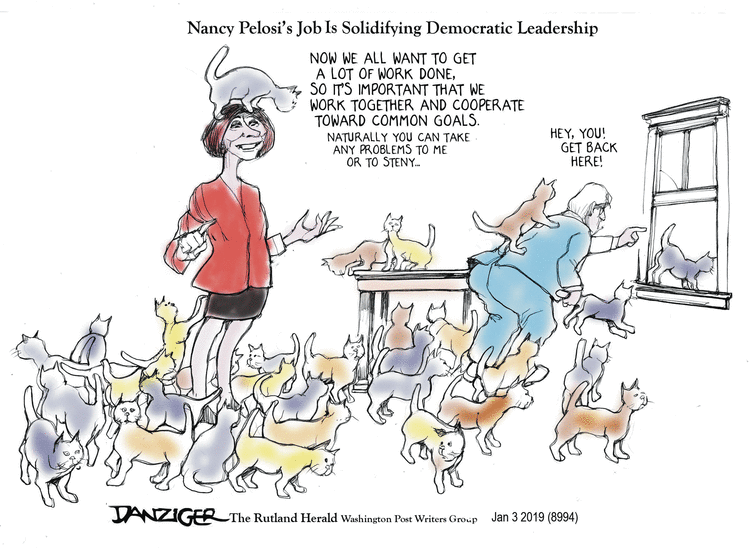CSotD: Satire Is What Closes On Saturday
Skip to commentsMatt Davies celebrates one of the most hilarious misfires in a very long time, the attempt of conservative trolls to shame Alexandria Ocasio-Cortes by posting a musical video she’d made in college which was so wonderful and winning that I’m not even going to dig up a link because I’m sure you’ve seen it.
The recreation of the dance sequence in “The Breakfast Club” went viral because it made people smile, including some who said they didn’t agree with her policies but were captivated by her personality, and it even earned an affectionate thumbs-up from Molly Ringwald, star of the movie being spoofed.
Ocasio-Cortes herself responded with a video showing her dancing into her office, a warning to Grumpy Old Farts everywhere that girls just want to have fun, that Congresswomen just want to have change and that your sons and your daughters are beyond your command.
Meanwhile, another bit of pop culture was being spoofed, this time unintentionally, as newly-elected Representative Rashida Taliba seemed to recall the theme from “Shaft” — “I’m talkin’ about Trump,” as the chorus sings, “We can dig it.”
Several Democratic leaders responded that was not how they would have phrased it, but then quickly switched to whether it was time to start talking impeachment quite yet.
Guess which part of that response got all the coverage?
Davies suggests that a college kid’s school-sponsored dance routine overshadowed a US President’s state-sponsored propaganda routine.
That’s a solid, readily grasped bit of satire.
So, too, is Jeff Danziger‘s commentary on, despite all the early cheering over their capture of the House, the challenge facing the Democratic Party.
Several cartoonists have suggested that Pelosi’s re-gaining of the Speakership will overturn the Trump agenda, mostly making use of her gavel and his head, but that seems to be putting the cart ahead of the horse.
She can be a sea-anchor, slowing his drift, or impose a deadlock, but the Senate is still in GOP hands and the President is not simply unafraid of obstructing the nation’s business but glorying in his ability to do so.
Meanwhile, Danziger uses the familiar simile of herding cats to point out the Democrats’ main challenge, which is to get themselves, if not on the same page, at least headed in more or less the same direction.
I like Danziger’s cartoon because, while it does indicate a difficult task ahead, it doesn’t foretell failure, nor does it suggest incompetence, only challenge.
It’s a thin line to walk, and I had a back-and-forth on the topic last night with a pair of cartoonists whose work I admire, on the topic of newly announced candidates and depicting their challenges (the cartoonists’ POV) without (my response) predicting failure and thus undermining their campaigns in the public eye.
I concluded by saying I thought it would make a good panel discussion: How do you greet an announced candidacy without fawning, but without becoming the opposition?
And should you even try to avoid stating a strong opinion one way or the other, at the start?
It’s my contention that it’s easier to find the right tone in depicting the present than when you are, essentially, predicting the future.
Here, having just ridiculed the hypocrisy of the GOP over the AOC dancing video, Davies takes a less harsh tone in showing the change the Democratic House brings to things.
It’s not a matter of favoring one party over the other, though he’s generally a progressive.
Rather, just as Danziger notes the challenges Pelosi faces, Davies depicts the change she is actually making, from a one-way, my-way highway to a street that should run two ways.
But it’s only paint. He’s not showing her putting up Jersey Barriers to absolutely define those lanes, and while we all base our lives and safety on compliance with the paint stripes on the highway, that reliance is based on a social contract we’ve seen broken often in the past two years.
Meanwhile, on the topic of criticizing emerging candidates, Clay Jones offers a satiric toolbox for making sure your criticism of Elizabeth Warren is not simply politically insightful but racially offensive.
I like the piece, because I’m flabbergasted that so many non-natives are eager to criticize Warren for accepting Trump’s challenge on behalf of their red brothers, but aren’t aware that — regardless of intent — “comical” depictions of feathers and scalps and suchlike is as deeply offensive in the native community as blackface — regardless of intent — is to African-Americans.
The problem is that, as silly as Jones’ cartoon is, it will likely go over the heads of its intended targets.
Swift described satire as “a sort of glass, wherein beholders do generally discover everybody’s face but their own,” and that’s only if they know it’s satire.
His own “Modest Proposal” became famous not because it mocked heartless policies but because so many readers thought he was sincere.
That was nearly 300 years ago, but little has changed. In the current Elizabeth Warren kerfuffle, Devorah Blachor wrote this for McSweeneys, which someone shared on Facebook.
It was, first of all, on McSweeneys, but if people can mistake Onion stories and Andy Borowitz’s work as straight reporting, I won’t quibble over their not recognizing McSweeneys as a site for intelligent satire.
Though an author with a woman’s name writing in a male voice could be a clue.
As might be the hilariously ridiculous point of view expressed.
Yet people responded to the posting as if the story were written in earnest, just as, 289 years ago, people thought Swift genuinely proposed boiling and eating the children of the poor.
“Satire is what closes on Saturday,” George Kaufman said, then disproved it by having “Of Thee I Sing” go for over 400 shows on Broadway.
And this is encouraging:
Michael de Adder‘s cartoon got a chuckle, and I’ve seen a few references to the gun-at-my-own-head tactic on social media.
But you know satire has a home when even relatively unfunny, non-cartoonist commentators on news channels start referring to Trump’s “Blazing Saddles strategy.”






Comments 3
Comments are closed.